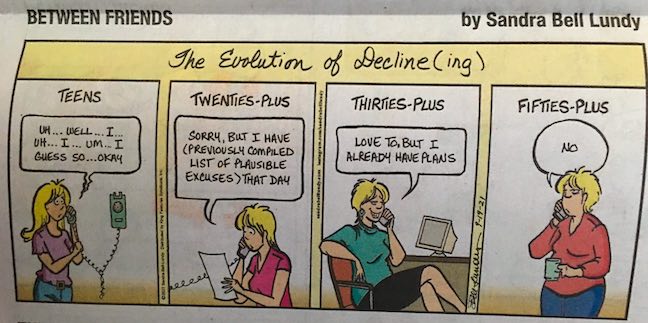Today, Wednesday Sept 29, 2021, is fine if somewhat overcast fall day. The leaves on my mini maple trees are turning their fall colors, and it’s just about time to sow the fall cover crop in the garden. Seasonal rituals, so to speak.
I have a few rituals of my own. One is reading the comic section of the Sunday paper. That’s the first section I go for. A couple of weeks ago, more specifically Sept 19, this strip of Between Friends appeared. It certainly felt familiar. As a self-defense teacher for over a quarter of a century, I’ve heard stuff like this. A lot.

And we go over this in class.
This strip depicts the same character, at different ages, declining an invitation. The teen girl is characterized as not quite getting out a NO and stumbling into acquiescence. The young adult woman is saying that NO, trying to make it more credible with the words “sorry” and “but” as well as an excuse (she has a whole list of possible excuses ready, just for these occasions). The verging-on-middle-age woman has dispensed with “sorry” as well as with using a specific excuse. And the older, wiser woman is just saying NO, because NO is a complete sentence.
There will be times in your life where you mess up, and you should say sorry. Declining an invitation, indeed setting any boundary, should not be such an occasion.
I also generally try to get rid of the BUTs in the middle. BUT is a minimizer — it says you’re not really all that sorry, or that you really would NOT love to.
NO is a complete sentence. Is it too brusque? Consider the relationship with whom you’re having this conversation. Often you really don’t owe them an explanation, and if not please do not feel that you’re being rude by not offering one. Many people feel compelled to have to explain themselves, when they don’t. Explaining yourself to another can indicate a close relationship. Or wanting to be heard and understood by someone you see on a regular basis. Or it can manifest a power imbalance.
A good all-around decline could be:
- Thank you for inviting me, I can’t make it
- That’s so kind of you, and no thanks
- I appreciate your offer of help, and no thanks
If the person presses you on why, try repeating the second clause of the decline. “I just can’t make it.” “No thanks.” “I said no thanks.” Trying to push past your boundary is itself a boundary violation.
In just about all of our classes we cover the fine art of Just Saying No. And, for younger tweens and teens, we have classes more finely tuned to those age group precisely because at different stages they will have different understandings of and skill-sets for boundaries, as well as more built-in power imbalances, as well as enhanced self-consciousness.
Speaking of which, we have a full schedule of in-person classes for the Fall, and I’ve even begun looking at my winter calendar. Classes for tweens, younger teens, older teens. And, of course, classes for those more independent and still seeing more maturity.
What do you think? How well does this comic strip characterize the declining skills of the age groups, in your experience? How do you decline invitations, and how’s that changed over your life so far?
Stay safe, live life.

